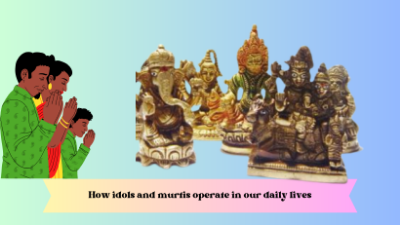
Idols and murtis (statues or images) of deities hold significant importance in various religious and spiritual traditions, including Hinduism, Buddhism, and other faiths. These representations of divine beings are believed to operate in several ways in our daily lives, providing both spiritual and psychological benefits. Here are some ways in which idols and murtis impact our daily lives and their associated benefits:
1. Facilitating Devotion and Connection: Idols and murtis serve as tangible representations of the divine, making it easier for individuals to establish a personal connection with the spiritual realm. They provide a focal point for devotion, meditation, and prayers, allowing worshippers to direct their thoughts and emotions toward the divine presence. This connection fosters a sense of closeness and communion with the divine.
2. Enhancing Concentration: When engaging in spiritual practices like meditation or prayer, having a visual representation, such as an idol or murti, can help enhance concentration. Gazing at the form of the deity can assist in calming the mind and staying focused, leading to a deeper meditative experience.
3. Inspiring Virtues and Qualities: Idols and murtis often depict deities embodying specific virtues and qualities. By contemplating these images, individuals can be inspired to cultivate those virtues in their own lives. For example, the image of a compassionate deity might encourage worshippers to practice kindness and empathy.
4. Providing a Source of Comfort: In times of distress or emotional turmoil, the presence of an idol or murti can offer solace and a sense of reassurance. Many people turn to their chosen deity for comfort and guidance during challenging moments, feeling a spiritual support system that brings emotional relief.
5. Symbolizing Higher Ideals: The physical form of an idol or murti symbolizes higher spiritual ideals and truths. These symbols remind individuals of the transcendental aspects of life and encourage them to align their actions with these principles, promoting personal growth and self-improvement.
6. Ritualistic Practices and Offerings: Idols and murtis are central to ritualistic practices, where offerings and ceremonies are performed as acts of devotion. These rituals reinforce a sense of continuity with tradition, allowing individuals to engage in sacred customs that have been passed down through generations.
7. Building Spiritual Discipline: Regular interaction with idols and murtis fosters spiritual discipline. Whether it's daily prayers, meditation, or participating in religious ceremonies, the presence of these representations can help establish and maintain a consistent spiritual routine.
8. Cultivating Reverence and Gratitude: Interacting with idols and murtis encourages a sense of reverence and gratitude towards the divine. The act of offering prayers, lighting incense, or placing flowers before these representations helps individuals express their thankfulness for the blessings received.
9. Promoting Unity and Community: Idols and murtis are often found in places of worship, bringing individuals together in communal acts of devotion. These shared practices create a sense of unity and belonging within a religious or spiritual community.
In conclusion, idols and murtis have a multifaceted role in our daily lives. They act as bridges between the physical and spiritual realms, providing a means of connection, inspiration, and guidance. The benefits they offer are both spiritual and psychological, contributing to personal growth, inner peace, and a deeper sense of purpose.




